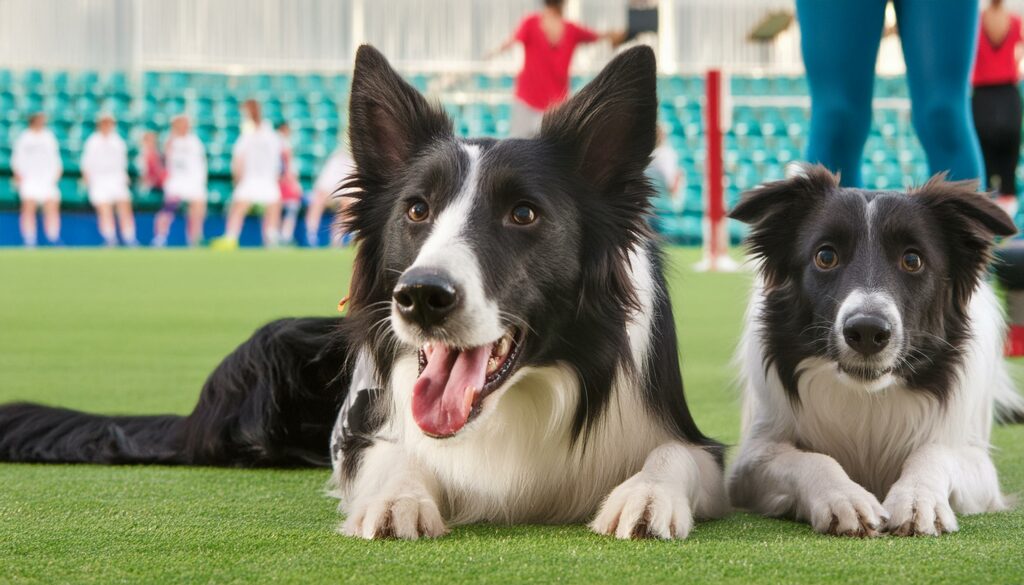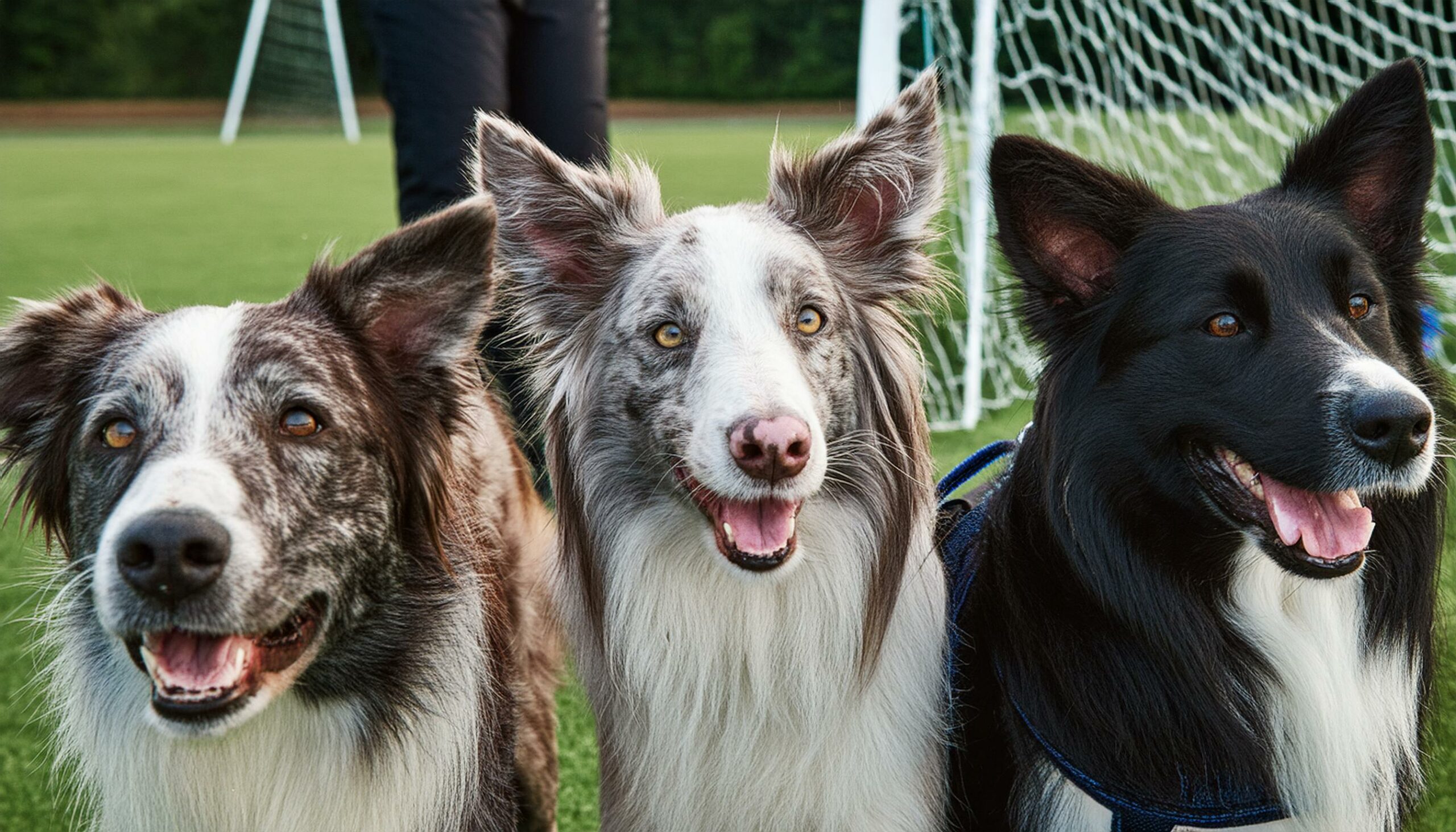Border Collies, often heralded as one of the most intelligent and versatile dog breeds, have captivated the hearts of dog enthusiasts worldwide. Renowned for their exceptional herding skills, agility, and unwavering loyalty, Border Collies are undeniably remarkable companions. However, prospective dog owners often wonder, “Are Border Collie dogs friendly?” This inquiry delves into the intricate nuances of the Border Collie’s temperament and behavior, shedding light on their innate characteristics and the factors that influence their friendliness.
Understanding Border Collie Temperament
Border Collies possess a unique blend of intelligence, energy, and instinct, shaped by centuries of selective breeding for herding prowess. Their temperament is characterized by a keen intellect, intense drive, and remarkable work ethic. While these traits contribute to their exceptional performance in various canine activities, they also influence their behavior and interactions with humans and other animals.
Intelligence and Energy Levels
At the core of the Border Collie’s temperament lies their unparalleled intelligence and boundless energy. Ranking at the top of the canine intelligence hierarchy, Border Collies exhibit remarkable problem-solving abilities and a remarkable capacity for learning complex tasks and commands. However, their high intelligence necessitates mental stimulation and engagement to prevent boredom and behavioral issues. Without adequate outlets for their energy, Border Collies may resort to destructive behaviors as a means of channeling their innate drive.
Socialization and Training
Early socialization plays a pivotal role in shaping a Border Collie’s temperament and behavior. Exposing them to diverse experiences, people, animals, and environments during their formative months fosters confidence, resilience, and sociability. Positive interactions with strangers, children, other pets, and novel stimuli help mitigate fearfulness and anxiety, laying the foundation for a well-adjusted and friendly adult dog.
Factors Affecting Border Collie Friendliness
The friendliness of a Border Collie is influenced by a myriad of factors, including genetics, early socialization experiences, and the owner’s approach to training and management. While Border Collies are inherently affectionate and loyal towards their families, individual differences in temperament and personality may manifest based on a variety of influences.
Early Socialization Experiences
Early socialization experiences play a pivotal role in shaping a Border Collie’s worldview and interactions with the world around them. Introducing them to a diverse range of stimuli—from different people and animals to various environments and situations—instills confidence, resilience, and adaptability. Positive encounters during the critical socialization period (typically between 3 and 14 weeks of age) lay the groundwork for a well-rounded and socially adept adult dog.
Genetics and Breeding
While genetics contribute to a Border Collie’s predisposition towards certain behaviors, it’s essential to recognize that each dog is an individual with unique temperament traits. Responsible breeding practices prioritize temperament alongside physical health and conformation, aiming to produce puppies with stable, predictable temperaments conducive to life as beloved companions. However, genetics alone do not determine a dog’s destiny; nurturing and environmental factors play significant roles in shaping their behavior and disposition.
Owner’s Influence
The owner’s approach to training, socialization, and management significantly influences a Border Collie’s behavior and temperament. Consistent, positive reinforcement-based training methods foster trust, cooperation, and mutual respect between the dog and their owner. Establishing clear boundaries, providing structure, and addressing undesirable behaviors promptly and effectively contribute to a harmonious relationship built on mutual understanding and communication.
Traits of a Friendly Border Collie

Friendly Border Collies exhibit several endearing traits that distinguish them as affectionate, sociable companions. While individual temperament varies, common characteristics of a friendly Border Collie include:
- Affectionate: Friendly Border Collies are affectionate and enjoy spending time with their families, often seeking out physical contact and companionship.
- Sociable: They exhibit a friendly demeanor towards strangers, greeting them with enthusiasm and curiosity rather than suspicion or apprehension.
- Playful: Friendly Border Collies possess a playful disposition, engaging in interactive games and activities with zest and enthusiasm.
- Adaptable: They demonstrate adaptability in various environments and situations, displaying resilience and composure in unfamiliar or challenging circumstances.
- Non-Aggressive: Friendly Border Collies exhibit non-aggressive behavior towards humans and other animals, preferring to resolve conflicts through peaceful means or avoidance.
Tips for Encouraging Friendliness in Border Collies
Fostering friendliness in Border Collies involves creating a nurturing environment that promotes positive interactions, reinforces desirable behaviors, and addresses potential challenges proactively.
Positive Reinforcement Training Methods
Utilizing positive reinforcement-based training methods, such as clicker training or reward-based obedience training, cultivates a strong bond of trust and mutual respect between the dog and their owner. Rewarding desired behaviors with treats, praise, and playtime reinforces those behaviors, encouraging the Border Collie to repeat them in the future.
Providing Mental and Physical Stimulation
Border Collies thrive on mental and physical stimulation, requiring ample opportunities for exercise, exploration, and engagement. Engaging them in activities such as obedience training, agility courses, interactive games, and puzzle toys channels their energy productively while stimulating their minds and satisfying their innate curiosity.
Socialization from an Early Age
Early and ongoing socialization is crucial for shaping a Border Collie’s social skills, confidence, and demeanor towards humans and other animals. Exposing them to a diverse range of experiences—from meeting new people and animals to encountering novel sights and sounds—builds resilience, fosters adaptability, and cultivates a friendly and outgoing disposition.
Common Misconceptions about Border Collies
Despite their widespread popularity and acclaim, Border Collies are subject to several misconceptions and stereotypes regarding their temperament and behavior. Dispelling these myths is essential for promoting a more accurate understanding of the breed and fostering positive relationships between Border Collies and their human companions.
Addressing Misconceptions about Their Temperament
One common misconception is that all Border Collies are hyperactive or high-strung. While they do possess boundless energy and enthusiasm, proper training, exercise, and mental stimulation can help manage their activity levels and prevent behavioral issues. Additionally, Border Collies can adapt well to various living situations, including apartments, as long as their exercise and mental stimulation needs are met.
Dispelling Myths about Their Behavior
Another prevalent myth is that Border Collies are inherently aggressive or unfriendly. In reality, aggression in Border Collies is often a result of fear, insecurity, or lack of socialization rather than innate aggression. With proper training, socialization, and management, Border Collies can be affectionate, gentle, and well-mannered companions who form strong bonds with their families.
The Importance of Responsible Ownership
Responsible ownership is paramount when it comes to ensuring the well-being and happiness of Border Collies. Providing a loving, nurturing environment that meets their physical, mental, and emotional needs is essential for fostering a strong bond and nurturing a friendly and well-adjusted companion.
Commitment to Training and Socialization
Investing time and effort into training and socialization from the puppy stage lays the foundation for a well-behaved and socially adept Border Collie. Consistent, positive reinforcement-based training methods, coupled with early and ongoing socialization experiences, foster good manners, confidence, and adaptability.
Providing a Suitable Environment for the Dog’s Needs
Creating an enriching environment that caters to a Border Collie’s physical and mental needs is essential for their overall well-being and happiness. This includes providing regular exercise, mental stimulation, socialization opportunities, and a safe, comfortable living space where they can thrive and flourish.
Conclusion
In conclusion, Border Collies are capable of being friendly, affectionate, and well-mannered companions when provided with the proper care, training, and socialization. Understanding their temperament, dispelling misconceptions, and committing to responsible ownership are essential for fostering a positive relationship with these remarkable dogs.
FAQs
Are Border Collies good with children?
Border Collies can be excellent family dogs, especially when raised with children and properly socialized. However, supervision is recommended to prevent herding behavior.
Do Border Collies get along with other pets?
With proper socialization and training, Border Collies can coexist peacefully with other pets, including cats and dogs. Early introductions are key to fostering positive relationships.
How much exercise do Border Collies need?
Border Collies are high-energy dogs that require at least 1-2 hours of vigorous exercise daily, along with mental stimulation to keep them happy and healthy.
Can Border Collies be left alone for long periods?
Border Collies thrive on companionship and may experience separation anxiety if left alone for extended periods. They do best in homes where someone can spend significant time with them.
Do Border Collies make good watchdogs?
While Border Collies are alert and attentive, they are not typically guard dogs. They may bark to alert their owners of strangers or unusual activity but are generally friendly towards visitors.
